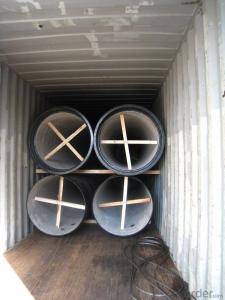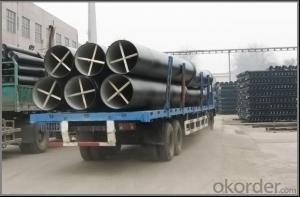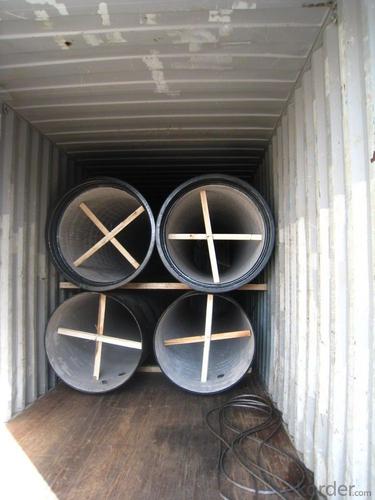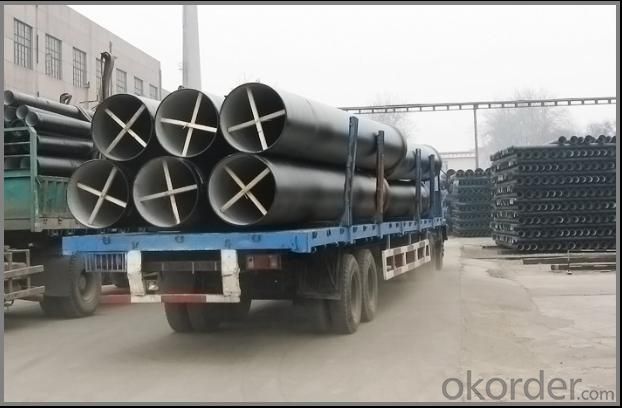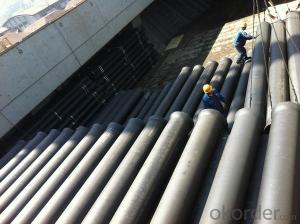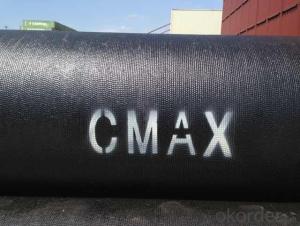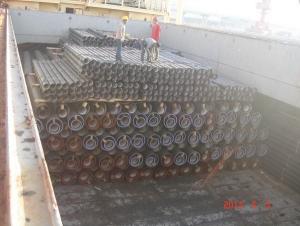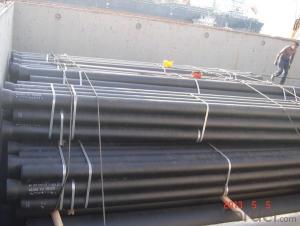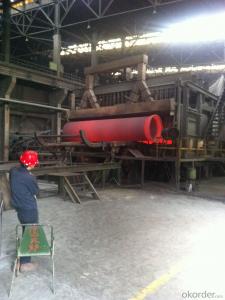DUCTILE IRON PIPE DN1000 K7CLASS
- Loading Port:
- Tianjin
- Payment Terms:
- TT OR LC
- Min Order Qty:
- -
- Supply Capability:
- 30000Tons m/month
OKorder Service Pledge
OKorder Financial Service
You Might Also Like
CNBM ductile iron pipe ranges from DN80-DN1600mm (T-Type, Class K9), effective length 6m, comply with ISO2531 Standard
Company Profile
CNBM International Corporation is the leading production base and renowned supplier of Ductile Iron Water Pipe systems of both potable and waste water in China. We are constantly looking to develop high quality products to ensure the longest service life and wonderful performance.
CNBM Pipelines regard quality as the essential factor leading to successful business. Every pipe is tested in accordance with BS EN545 (water application) or BS EN598 (sewer application). CNBM Pipelines products comply with and are tested according to the relevant European and International Standards. Our pipes are manufactured under the quality management system BS EN ISO 9001. After years of efforts, CNBM Pipelines has built up great reputation in terms of quality and service among customers worldwide
Product Introduction
CNBM ductile iron pipe ranges from DN80-DN1600mm (Tyton, T-Type, Class K7/K8/K9), effective length: 6m, complying with BS EN545/EN598/ISO2531/BS4772.
Specification& Payment terms
Internal lining: Pipes shall have an internal cement mortar lining in acc with ISO4179.
External coating: Pipes shall be externally coated with metallic zinc spray plus a further layer of resin painting to ISO8179.
Gasket: 100% SBR/NBR/EPDM gasket in accordance with ISO4633.
Packing: Pipes from DN100 to DN300 be bundled with steel belts, the others are in bulk.
Payment term: By 30% T/T advance payment + 70% Irrevocable L/C at sight.
Packing: In bulk vessel or in container.
- Q: Are ductile iron pipes suitable for installation in areas with high seismic activity?
- Yes, ductile iron pipes are suitable for installation in areas with high seismic activity. Ductile iron pipes have excellent strength and flexibility, allowing them to withstand ground movements caused by earthquakes. Their ability to absorb and distribute stress makes them a reliable choice for underground infrastructure in seismic-prone regions.
- Q: It's not easy to drill ductile iron with cobalt high speed steel bit. Please help to point it out
- Choose carbide or whole carbide drill, about 90HRC in hardness. But it requires a high number of drills, around 3000.
- Q: What is the composition of ductile iron pipes?
- Ductile iron pipes are primarily composed of iron, along with small amounts of carbon, silicon, and other alloying elements. The iron content typically ranges from 90% to 94%, while carbon content is usually around 3% to 4%. Silicon is added in the range of 1.5% to 3%, which helps enhance the ductility and strength of the iron. Other alloying elements such as manganese, sulfur, and phosphorus may also be present in smaller quantities. The composition of ductile iron pipes is carefully engineered to achieve specific properties. The addition of carbon and silicon improves the hardness and strength of the iron, making it more suitable for demanding applications. The presence of these alloying elements also contributes to the ductility of the pipes, allowing them to be easily bent and molded without breaking. Overall, the composition of ductile iron pipes is designed to provide a balance between strength, ductility, and resistance to corrosion. This makes them ideal for use in water and sewage systems, where they can withstand high pressure, handle heavy loads, and resist the corrosive effects of water and other chemicals.
- Q: Are ductile iron pipes suitable for underground river crossings?
- Indeed, underground river crossings can be facilitated by the use of ductile iron pipes. Ductile iron, being a robust and long-lasting material, can endure the external stresses and burdens encountered in such crossings. With its superb tensile strength, impact resistance, and durability, ductile iron is exceptionally well-suited for underground applications where the pipes may face elevated water pressure, ground displacement, or various environmental influences. Furthermore, ductile iron pipes possess an extended lifespan and are impervious to corrosion, a vital attribute when dealing with water crossings. Their capacity to withstand these circumstances renders them a dependable choice for underground river crossings.
- Q: How are ductile iron pipes tested for hydrostatic pressure?
- Ductile iron pipes are commonly used for water and wastewater applications due to their strength and durability. To ensure the quality and reliability of these pipes, they undergo hydrostatic pressure testing. Hydrostatic pressure testing involves subjecting the ductile iron pipes to internal pressure higher than their normal operating pressure. This is done to assess their ability to withstand the maximum pressure they are expected to encounter during their service life. The testing process typically begins with the selection of a sample set of pipes from a production batch or shipment. These samples are carefully prepared by removing any surface coatings or debris that could affect the accuracy of the test results. Next, the prepared samples are placed within a specially designed test rig or test line. The test rig is equipped with all the necessary connections, valves, and gauges to control and monitor the test conditions accurately. Once the samples are secured in the test rig, water or another suitable test fluid is slowly introduced into the pipes. The pressure is then gradually increased to a predetermined level, typically exceeding the expected operating pressure by a certain factor. This elevated pressure is maintained for a specified duration, usually for several hours, to assess the pipes' structural integrity and leak resistance. During the test, the pipes are closely monitored for any signs of leakage, deformation, or failure. Skilled technicians or engineers observe the pressure gauges and visually inspect the pipes for any visible defects or abnormalities. Additionally, automated systems may be employed to continuously record and analyze the pressure readings, ensuring accurate data collection. After the specified test duration, the pressure is gradually released, and the pipes are carefully inspected for any permanent deformation or residual stress. This inspection may involve visual examination, dimensional measurements, or even non-destructive testing techniques such as ultrasonic testing or magnetic particle inspection. The test results are then evaluated against the relevant industry standards or specifications to determine the pipes' compliance with safety and performance requirements. If the pipes pass the hydrostatic pressure test, they are deemed suitable for their intended application. However, if any issues or failures are identified, further investigation, analysis, or corrective actions may be necessary before the pipes can be approved for use. Overall, hydrostatic pressure testing plays a crucial role in ensuring the quality and reliability of ductile iron pipes. By subjecting these pipes to rigorous testing procedures, manufacturers can provide customers with pipes that meet the highest standards of safety and performance.
- Q: What are the risks in the process of conveying ductile iron pipes?
- Pile up: when the pipe is stacked, the lower part of the pipe should be covered with a tie or cushion block. The socket of the pipe is interlocked with each other, and the stop wedge must be put in place to prevent the pipe from rolling. Not allowed to be piled on marshes, rough slopes, or badly polluted areas.
- Q: What is the expected deflection limit of ductile iron pipes?
- The expected deflection limit of ductile iron pipes varies depending on several factors such as pipe diameter, wall thickness, and soil conditions. However, general industry standards suggest that ductile iron pipes should not exceed a deflection limit of 2% for underground installations. This means that the maximum allowable deflection would be 2% of the pipe's diameter. It is important to note that exceeding the deflection limit can lead to potential issues such as reduced flow capacity, increased risk of pipe failure, and compromised structural integrity. Therefore, it is crucial to carefully consider and adhere to the recommended deflection limits during the design and installation of ductile iron pipes to ensure their long-term performance and reliability.
- Q: How do ductile iron pipes perform in high-traffic areas?
- Due to their inherent strength and durability, ductile iron pipes exhibit exceptional performance in high-traffic areas. The composition of these pipes includes graphite nodules, which impart them with their characteristic ductility. This ductility enables the pipes to flex and endure heavy loads and vibrations caused by traffic without experiencing any cracks or breaks. In areas with high traffic, where the ground is constantly in motion and subjected to heavy vehicle loads, ductile iron pipes demonstrate superior resistance to stress and impact. Their capacity to absorb and distribute the pressure from traffic ensures that these pipes maintain their structural integrity over time. This aspect is particularly significant since any damage or failure in a pipe system can lead to expensive repairs and disruptions in the water supply. Moreover, ductile iron pipes possess a high level of resistance to corrosion, making them suitable for installation in high-traffic areas exposed to diverse environmental conditions. Typically, these pipes are lined with a protective layer, such as cement mortar or epoxy, which provides an additional barrier against external factors. This resistance to corrosion guarantees the longevity of the pipes and reduces the need for frequent maintenance or replacement. Furthermore, ductile iron pipes exhibit excellent flow characteristics, enabling efficient water distribution even in areas with high traffic demands. The smooth interior surface of these pipes minimizes friction and pressure losses, ensuring a consistent and reliable water supply to meet the needs of the surrounding population. In conclusion, ductile iron pipes are a reliable and robust choice for high-traffic areas. Their strength, durability, resistance to corrosion, and efficient flow characteristics make them well-suited to withstand the demands and challenges posed by heavy traffic. They guarantee the continuous supply of water without compromising the structural integrity of the pipe system.
- Q: Can ductile iron pipe be used for water well applications?
- Yes, ductile iron pipe can be used for water well applications. Ductile iron pipe is known for its strength and durability, making it suitable for various applications including water well systems. It has excellent corrosion resistance, which is crucial for water well applications where the pipe is constantly exposed to water and potential contaminants. Additionally, ductile iron pipe has the ability to withstand high pressure and external loads, making it a reliable choice for water well systems that require a strong and long-lasting pipe material.
- Q: Are ductile iron pipes resistant to frost heave?
- Yes, ductile iron pipes are generally resistant to frost heave due to their strong and flexible nature.
Send your message to us
DUCTILE IRON PIPE DN1000 K7CLASS
- Loading Port:
- Tianjin
- Payment Terms:
- TT OR LC
- Min Order Qty:
- -
- Supply Capability:
- 30000Tons m/month
OKorder Service Pledge
OKorder Financial Service
Similar products
Hot products
Hot Searches
Related keywords
